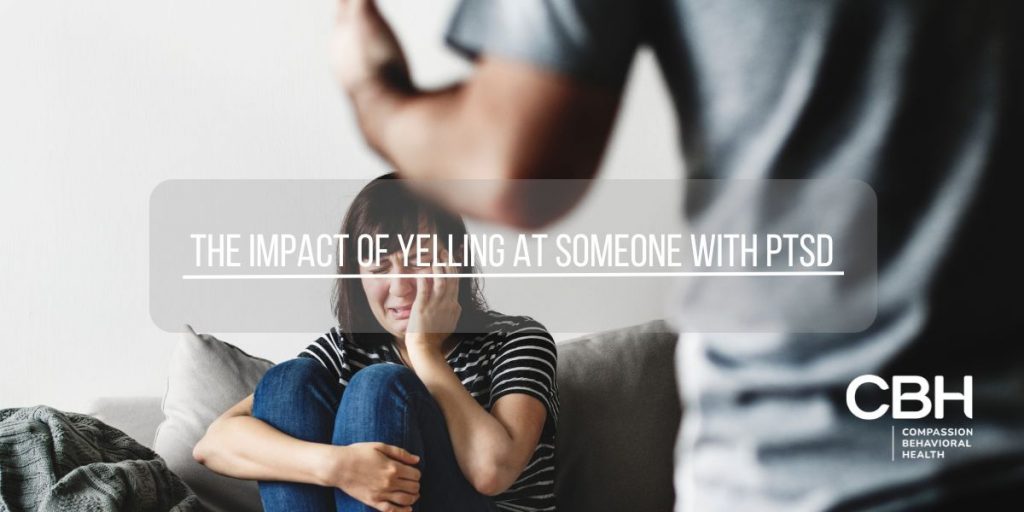In our daily lives, we interact with a wide range of people, each with their own unique experiences and challenges. However, it is crucial to recognize that not everyone responds to certain stimuli in the same way. For individuals living with post-traumatic stress disorder (PTSD), even seemingly harmless actions can have a significant impact on their well-being. One such action that can be particularly detrimental is yelling. In this article, we will delve into the intersection of yelling and PTSD, exploring the profound psychological effects it can have on individuals already grappling with this condition. By understanding this dynamic, we can develop effective strategies to ensure empathetic and respectful communication.
Understanding PTSD: A Brief Overview
Before we explore the impact of yelling on individuals with PTSD, it is crucial to have a basic understanding of this condition. PTSD is a psychological disorder that can develop in individuals who have experienced or witnessed a traumatic event. This can include incidents such as physical or sexual assault, natural disasters, accidents, domestic violence, or military combat. The symptoms of PTSD can vary from person to person but often include intrusive thoughts, nightmares, flashbacks, and intense emotional distress. These symptoms can severely impact an individual’s quality of life and their ability to function in various social and professional settings.
What is PTSD?
PTSD, which stands for post-traumatic stress disorder, is a mental health condition that occurs as a result of experiencing or witnessing a traumatic event. The traumatic event can lead to a range of symptoms, including intense anxiety, intrusive memories, and difficulty concentrating. These symptoms can be triggered by various stimuli, making it challenging for individuals with PTSD to navigate their daily lives.
Common Triggers for PTSD
While the specific triggers for individuals with PTSD can vary, there are several commonly reported triggers that can cause distressing symptoms. These triggers can range from certain sights, sounds, or smells associated with the traumatic event to situations that remind the individual of their past trauma. It is important to note that yelling, particularly aggressive and forceful yelling, can be a potent trigger for those with PTSD, leading to a multitude of adverse effects.
The Psychological Effects of Yelling
The act of yelling can have significant psychological effects on individuals, regardless of whether they have PTSD or not. Yelling is often associated with aggression, anger, and intimidation, which can trigger various stress responses in the body.

The Stress Response to Yelling
When an individual is subjected to yelling, their body enters a state of heightened stress. The adrenaline and cortisol levels in their system rise, leading to a fight-or-flight response. This response, although a natural defense mechanism, can be particularly overwhelming for individuals with PTSD. It can exacerbate their symptoms, intensify feelings of anxiety, and magnify their emotional distress, potentially causing them to relive their traumatic experiences.
Long-term Consequences of Verbal Aggression
The long-term consequences of ongoing exposure to yelling can be profound. For individuals with PTSD, the impact can be even more detrimental. Research has shown that individuals subjected to chronic yelling can experience increased risk of developing depressive symptoms, worsening their already fragile mental state. The constant exposure to aggression through yelling can also erode their self-esteem, further exacerbating their struggles with PTSD. It is vital to recognize the potential harm that yelling can inflict and work towards finding alternative means of communication.
The Intersection of Yelling and PTSD
When the impact of yelling and PTSD converges, the consequences can be particularly distressing. The heightened sensitivity of individuals with PTSD means that even minor conflicts or disagreements can trigger their symptoms. Yelling, which introduces aggression and hostility into the interaction, can intensify these triggers, leading to an escalation of symptoms and a considerable emotional toll.
How Yelling Can Trigger PTSD Symptoms
Yelling can serve as a powerful trigger for individuals with PTSD, reigniting their traumatic memories and plunging them into a state of overwhelming distress. The aggressive and forceful nature of yelling can mimic the threatening and dangerous situations that caused their PTSD in the first place. This triggers a cascade of emotions and physiological responses, further entrenching their symptoms and impeding their ability to cope.

Case Studies: Real-life Experiences
Real-life experiences and case studies provide compelling evidence of the impact of yelling on individuals living with PTSD. These stories offer insight into the profound difficulties faced by those trying to manage their symptoms while navigating often unpredictable social situations. By highlighting these experiences, we can develop a deeper understanding of the challenges faced by individuals with PTSD and work towards creating a more supportive environment for their recovery.
Coping Mechanisms for PTSD
While the impact of yelling on individuals with PTSD is significant, there are coping mechanisms and strategies that can help them navigate these challenges and minimize the adverse effects. Professional therapeutic approaches and self-help strategies can be valuable tools in managing PTSD symptoms.

Therapeutic Approaches to PTSD
Therapeutic approaches, such as cognitive-behavioral therapy (CBT) and eye movement desensitization and reprocessing (EMDR), have shown promising results in helping individuals with PTSD manage their symptoms. By working with a qualified therapist, individuals can learn effective coping mechanisms, develop emotional regulation skills, and reframe their traumatic experiences, ultimately reducing the impact of triggers such as yelling.
Self-help Strategies for Managing PTSD
Alongside professional intervention, individuals with PTSD can also incorporate self-help strategies into their daily lives to manage their symptoms. These strategies can include mindfulness and meditation exercises, engaging in physical activities, practicing deep breathing techniques during moments of stress, and fostering supportive relationships. By prioritizing self-care and implementing these strategies, individuals can develop a sense of empowerment and resilience, enabling them to better respond to triggering situations.
How to Communicate Effectively with Someone with PTSD
When interacting with someone who has PTSD, it is essential to approach communication with empathy, understanding, and respect. By adopting certain strategies, we can foster an environment that supports their recovery and minimizes potential triggers.
Tips for Respectful and Empathetic Communication
Respectful and empathetic communication is vital when interacting with someone with PTSD. Utilize active listening skills, validate their experiences, and avoid minimizing or dismissing their feelings. Additionally, ask how you can support them during triggering situations and provide reassurance when needed. By demonstrating empathy and understanding, you can create a safe space for open and honest communication.
The Role of Support Systems in PTSD Recovery
Support systems play a crucial role in the recovery process for individuals with PTSD. Whether it is family, friends, or support groups, having a network of individuals who understand their condition can provide invaluable support and validation. Encouraging their engagement with support systems and participating in their healing journey can help facilitate effective communication and enhance their overall well-being.
In conclusion, the impact of yelling on individuals with PTSD cannot be underestimated. The aggressive and forceful nature of yelling can trigger traumatic memories, intensify symptoms, and worsen their overall mental health. By recognizing this dynamic and employing respectful and empathetic communication strategies, we can create an environment that supports their recovery and minimizes potential triggers. Through a combination of therapeutic approaches, self-help strategies, and the presence of a supportive network, individuals living with PTSD can regain control of their lives and work towards a future free from the debilitating effects of their past trauma.
Get PTSD Treatments at CBH
Our team of professionals at Compassion Behavioral Health is dedicated to offering comprehensive care and tailored support to all individuals dealing with PTSD. Our mission is to provide a safe and nurturing environment where they can heal, grow, and rediscover their strength and resilience. Call us today to learn more about our PTSD treatment program.



